- Home
- Jeremy Robinson
The Divide Page 9
The Divide Read online
Page 9
Where the hell…
“Good,” the deep voice says, the familiarity of it pricking my numbed memory. I heard that voice, before I fell asleep.
Before I was knocked unconscious.
My memory returns with a second voice, this one instantly familiar, generating a mix of emotions starting with relief and ending in outrage. “She’s awake.”
I open my eyes to see Shua leaning over me. He looks concerned and a little bit apologetic, but not nearly enough to alter how I feel.
“Now I have to kill two men I care about,” I say, and I instantly regret speaking. My quasi-delirious state has weakened the safeguards that keep me from thinking and saying stupid things.
How could I care about Shua? I’ve known him for a very short amount of time, and hadn’t seen his face…
But that’s not true. I had seen his face before. All those years ago. Both of us so young. After years of marriage to a brutal man like Micha, Shua had treated me with a tenderness I had not experienced before. In truth, I had thought of him, and that single night, many times since, and had been pleased that such a man was the father of my son.
But now that man, elevated by the memory of a young, desperate woman, had proven himself to be treacherous and violent.
Shua smiles. “She’s okay.”
“I am pleased,” Plistim says, standing above his son, looking down at me and winking. I struggle to stand, ready to throttle the man, and then his son—my son’s grandfather and father—but moving is next to impossible. My hands and feet are bound.
“For your own safety,” Shua says.
“And yours,” I say.
He smiles again, and nods. Shua is a handsome man, like I remember, though he bears more scars now. Salem is a clear mix of Shua and his father, the son of two elder families, after all.
Then Shua stands, letting me see our surroundings for the first time, and triggering the rest of my memories.
Billowing above is a massive balloon built from a thin fabric I’ve never seen before. At the base is a metal basket in which a fire burns bright and hot, its flames licking up toward the balloon, but never spreading higher. A young woman stands beside the flames holding a bellows for stoking the fire.
She notes my attention and nods. “I’m Shoba. I am pleased to finally meet my cousin’s mother.”
I push myself up so I’m seated against the basket wall.
“She is my sister’s daughter. Her father was not known,” Shua says.
“Never married?”
“A lack of marriage did not prevent us from having a child,” he says.
“We did not have a child,” I say. “I had him. Alone.”
“You had a husband.”
“You’re right,” I say. “Alone would have been better.”
“She reminds me of your mother,” Plistim says to Shua, standing at the basket’s wall, looking out…at what? “A spirited woman makes a poor wife, but a good lover.”
“Father,” Shua says, a warning in his tone.
“And where is your mother?” I ask Shoba. When the girl looks at me, I’m shaken by her face. “In another balloon? Tied up? Or is she now married to your grandfather?”
Plistim huffs a laugh. “Told her that, did you?”
Shua says nothing, but doesn’t look thrilled.
Nor does Shoba. “She’s dead.”
Before I can apologize, more out of learned etiquette than actually feeling sorry, she adds a detail that does make me feel sorry.
“In the Cull,” Shoba says, and she returns to her duty, stoking the fire.
The Cull was the most successful of the few raids that have been carried out on the elusive Modernists. Thirty-seven people were killed. Men, women, and children. Most were tortured, horribly, and not one of them revealed the location of other Modernists. My father called it the ‘darkest moment in mankind’s history since the Time Before.’ Harsh words from a man who swore to uphold and protect the Prime Law at all costs. The worst part about this revelation is that Micha led that raid.
Actually, that’s not the worst part.
What’s worse is that I was fully willing to take part in a similar raid. Though Micha meant to kill me as well, I was happy to lead him and his men to the Modernists in the John Hancock tower. I went there to kill my own son. Though the Cull is regarded as a dark time in our recent past, I was willing to repeat it, and take part.
And Shua knows that.
But there’s no anger directed toward me, perhaps because he deceived me and knocked me unconscious. I remember that now, too.
Despite the Cull’s tragic results and the brutality with which it was carried out, the cause was just, and it still is. The Prime Law protects all people from the evils created by our forefathers. Breaking the law would bring untold suffering to all people, not just the few who fell for the romantic teachings of Modernist propaganda.
And that’s exactly what’s happening today.
I’m sorry that a girl like Shoba lost her mother, but what I regret most about today is not arriving in time to stop Plistim, kill my son, and ensure that my family’s name isn’t forever associated with betrayal, and the Golyat’s return. Of course, if the Golyat finds a way to New Inglan, there won’t be anyone left to curse my name.
Shoba goes rigid, and for a moment, I think she’s angry at me for not responding to her revelation about the Cull. Then I notice her eyes, staring out and down over the basket’s side. Her forehead pinches at the middle, her eyes widening, terrified by something below.
She’s not my blood. But I can’t stop myself from feeling a kinship with her. “What is it?”
Shua and Plistim both turn toward the girl. Then they follow her gaze downward. While both men are far more skilled at controlling and hiding their emotions, their complete lack of reaction says just as much.
“Can it see us?” Shua asks.
Plistim shakes his head. “The trees are too thick.”
“We’re not ready to face it,” Shua says. “Not yet.”
Face it? I think, having little doubt about what lurks below. They actually intend to fight the Golyat? The monster that laid waste to the Old World and left humanity on the brink of extinction?
“Let me see it,” I say.
“Not a chance,” Shua says.
“What do you think will happen? I’ll shout down and alert it to our passage? That I’ll compromise the safety of New Inglan? Only a fool would do that. Or a pair of fools.”
“She’s not including me in her insults,” Shoba says, her fear replaced by disrespect and indignation.
“Naïveté is forgivable,” I say. “In a few more years, you’ll be a fool, too. Or dead, along with the rest of humanity.”
“Is that what you were going to do with Salem?” Shoba asks. “Forgive him?” She rolls her eyes, looks back, and pales anew.
“Please,” I say to Shua. “Just let me see.”
Shua looks to Plistim, who shrugs. Now I know where Shua picked up the habit.
Shua crouches beside me. “Please don’t do anything stupid. You’re here because Salem asked, and we all approved. Your father is highly respected by the Modernists, and our son—”
“My son,” I grumble.
“We wouldn’t be here without him.” Shua slips his arms beneath mine and lifts. We’re unsteady for a moment, and I’m forced to lean against his chest for balance.
“What does that mean?” I ask. “How did Salem help you?”
Shua looks up at the balloon. “These were his creation.”
“He invented them?”
“He read about them in books,” Shua says, “but he figured out a way to build them. You could say he re-invented them.”
I nearly ask, ‘Salem can read?’ but the answer is clear. It’s not a skill he learned during his time with me.
I feel a similar wave of disorientation when I look away from Shua. I stare far into the distance, further than I’ve ever been able to see before. The horizon is even
further away than it was atop the John Hancock building.
How high are we? I wonder, remembering that the balloons had been flying up, just as much as away.
“Ready?” Shua asks, and when I nod he lifts me up and carries me to the side. Feet bound, my balance is precarious, but I hold onto the basket wall and manage to stand on my own. My balance is momentary, faltering the moment my eyes turn downward. I’m not entirely certain how high we are, but far to the right is Boston. The massive towers look short from my vantage point. And directly beneath us is the Divide, the bottom of which is cloaked in steam generated by the Karls River falls.
I want to drink in the view. I can probably see all of Essex, and the ocean beyond. I could study this image of the Divide for days. And to the left, the Old World stretches far beyond the limit of my eyes’ ability to focus.
That’s where I spot it—the Golyat. Its location is revealed, once again, by the motion of trees from its passing. The path leads directly toward us, but not on an intercept course. The wind will soon carry us out of its path. Assuming the forest canopy remains thick, and the Golyat doesn’t look up, it might not notice us.
But who can say for sure. We have no idea how well it sees, or hears, or smells. It might have heard our conversation. It might have seen the balloons lift off in Boston, and be rushing for a closer look. I find our shadow a half mile ahead, rolling over the tree tops. Had the Golyat been a little faster, the shadow would have crossed its path, and I have little doubt we’d have been detected.
That’s when my gaze lifts, and I see other balloons in the sky, some not too far away, others miles to the north and south. There are ten in all, carrying Plistim’s family, which could be fifty people, or more. After the Cull, smaller raids, and natural mortality rates, who’s to say how many wives, children, and grandchildren the man has left? Clearly a lot. Micha and his men might have even been outmatched if the Modernists had stopped to fight.
“What do you think?” Plistim asks, a smile on his face.
“That I won’t need to kill anyone,” I say. “You’re going to take care of that, all on your own.”
I can see he’s about to laugh, but a dry, husky chattering—like an oversized woodpecker—rises from below. The hairs on my arms stand on end. I’ve never heard the sound before, but some part of my instinctual brain understands its meaning.
Whether or not we’ve been seen, the Golyat is hunting us.
15
“How do we move faster?” I ask.
“We don’t,” Plistim says. “We are at the wind’s mercy. We can ascend and descend as long as we have fuel for the fire.”
“And how much fuel is left?” I scan the basket, seeing four backpacks, one of which holds my machete and knife, along with two fresh spears. They really were planning on my joining them. But how could they have known when I was coming? There’s no way they could have known for sure, but my father made a big effort to summon me. Did they know about his runners?
Plistim smiles in a way that says, ‘none.’ “We brought enough to cross the Divide. More and we would have been too heavy. Our journey was always meant to be on foot.”
“Journey to where?”
“I have ideas, but without knowing what we’re going to find, fate will determine our destination…or your son, whose intelligence can overcome fate.”
I can’t help but laugh. Salem, my son, is smart, and curious, but he’s no mastermind.
“You scoff at the accomplishments of your own blood?” Plistim asked. “I am a capable leader. Commanding.”
“Arrogant.”
He nods. “But Salem? He’s our guiding force. We did not know it before, but without him, we were aimless. Ships without rudders.”
I’m not sure what a rudder is, but I understand the point he’s making. I just have trouble believing it.
“Your son will determine our course, and when we find it, our new home, free of the Prime Law. Free to become what we want.”
“And what is it you want to be?” I’m not really interested, and I’m pretty sure the tone of my voice communicates that, but his reply is earnest.
“A painter.”
When I have no response for that, he explains, “Paint is a medium for creating images. Like charcoal on a flat stone.”
I remember spending entire days of my youth drawing animals on a large stone, washing it clean, and starting again. “You wish to be a child again?”
He chuckles and asks, “Don’t you?”
No wonder the Modernists appeal to the youth so easily. Not only do they pursue the forbidden and taboo, but they also indulge in the mindless expressions of the young, who have no understanding of the world, or the law. For a boy like Salem, on the cusp of leaving such childish things behind, about to step into the painful reality that is manhood, these ideas must have tasted like honey.
My anger toward my son fades a bit. What child could resist such temptations? Had I been approached at his age, charcoal in hand, I might have been corrupted as well. “Where is he?”
Plistim turns south and points. “There.”
The balloon is a mile away, on a solitary path, guided by the wind. The rest of the modernist balloons float to the east and north of us. “Who is with him?”
“My brother,” Shua says, “And his wife. A few others. Our best hunters. They’ll keep him safe.”
“How will we find them?” I ask, trying to block out the sound of snapping branches rising from far below.
“Do you see the red spot?” Plistim asks, pointing at Salem’s balloon again. The dark red spot is closer to brown, and I have little doubt it was created using blood. “That identifies his balloon. All the sons and daughters of Plistim can see it. And upon descending, we’ll head toward it. Right now the course is clear for all: south. Salem and those guarding him will wait for our arrival.”
“This is a big land,” I say. “You can’t—”
“Fire and smoke will be our guide,” Shoba says.
“Are you insane?” I say, loud enough to make my fellow passengers tense. Shua leans over the basket’s side, watching the Golyat’s path. I haven’t worked up the courage to look again. In a quieter voice, I say, “Do you intend to feed your people to the Golyat?”
“I intend to kill it,” Plistim says.
“How can you do that, when our ancestors—who could build cities beyond imagining—could not?”
“Did you know our ancestors traveled to the moon?” Plistim asks. “Before it was reduced to dust. They also built devices capable of destroying entire cities. Entire counties. They had conquered disease and sickness to a point where nearly all babies born lived long lives. Even the unhealthiest of them could live seventy years, sustained by their technology.”
“That’s all impressive, and hard to believe, but you’re actually proving my point.”
“What they did not have, was your son.”
I close my eyes, and control my emotions. I want to scream at the man, to remind him that my son is just a boy. He’s not a warrior, or a hunter, and as smart as he might be, he cannot conceive of a way to kill something he has never seen—certainly not something that survived the might of our ancestors, whose technology was powerful enough to create the Divide.
It’s not worth arguing, I decide. “Untie me.”
“You have clearly stated your desire to kill me,” Plistim says.
“More than once,” Shua adds.
They’re right, and as much as I would like revenge for the twisting of my son’s mind, and the deception that led me here, things have changed. “Your deaths are no longer my goal.”
Plistim narrows his eyes at me. “Explain.”
“I cannot kill you all, and simply littering the land with your corpses would do no good. The Golyat would find them. The only way I can uphold the Prime Law and protect the people of New Inglan is to help hide you…even if that means keeping you alive.”
Plistim smiles. “I am pleased to see Jesse’s logical mind was in
herited by his daughter.”
“Fuck you.”
“And his penchant for profanity.”
“Don’t speak about my father. You know nothing of him.”
His smile widens. “Your father was my friend.”
“Bullshit.”
“As youth, we were inseparable. You see, I was raised in Essex. Because of my interest in the Old World, and the library my father protected, I was sent as far south as possible, to be looked after by the elder of Essex until age, and the wisdom that comes with it, cured me of my infatuations. That was when your father and I became friends, and when I taught him all I had learned from the library, some of which he taught you.”
I don’t want to believe a word of it, but I had already begun to suspect my father’s collusion with the Modernists. The four runners were sent to ensure I would arrive in Boston on time. That I returned to him wounded was a coincidence. Had I not, I might not be here. And I’m not sure how I feel about that. While this is truly the last place I want to be—within the Golyat’s reach—my presence means that there is at least one person among the Modernists who hasn’t lost touch with reality. I’m not sure I can prevent the Golyat from discovering them, but I can at least try.
“My father was a Modernist,” I say.
“He…was sympathetic to our cause. And helped when he could, especially after the Cull. Future bloodshed was avoided, mostly thanks to the warnings he sent. But he also believed in the Prime Law and feared what would happen if it was broken. When Salem explained our plan—”
“My father saw Salem?” This revelation feels like a bigger betrayal than my father secretly aiding the Modernists.
“Once,” Plistim says. “Two weeks ago. He asked for Jesse’s help. To get you here. When he explained his plan, Jesse agreed. Begrudgingly, mind you. But he agreed. I believe his words were, ‘A mother should be with her son, even if it means leaving her father.’ But I also think he understood the truth.”
“And that is?”
“That life beyond the Divide, with us, holds more promise of a life worth living, for you.”
That’s when I understand. As well as Plistim thinks he knows my father, no one knows him like me, except maybe Grace. While unwilling to kill his grandson, his old friend, and people whose beliefs he understood, he would have seen that they needed guidance. That out here in the world beyond the Divide, they would need a shepherd to direct their path away from folly.

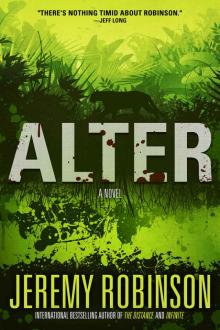 Alter
Alter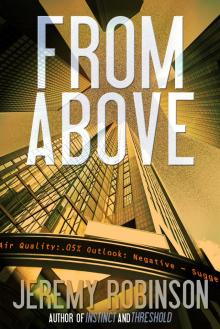 From Above - A Novella
From Above - A Novella Flux
Flux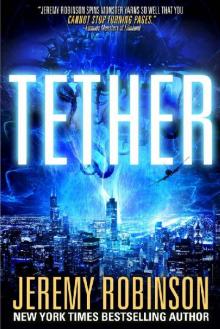 Tether
Tether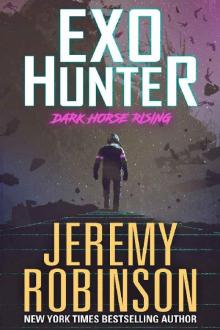 Exo-Hunter
Exo-Hunter Pulse
Pulse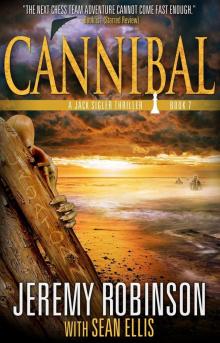 Cannibal
Cannibal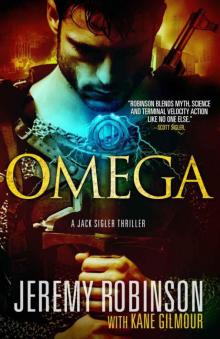 Omega: A Jack Sigler Thriller cta-5
Omega: A Jack Sigler Thriller cta-5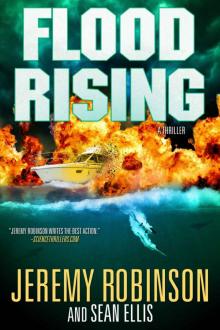 Flood Rising (A Jenna Flood Thriller)
Flood Rising (A Jenna Flood Thriller)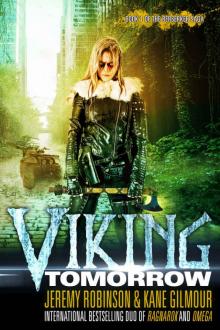 Viking Tomorrow
Viking Tomorrow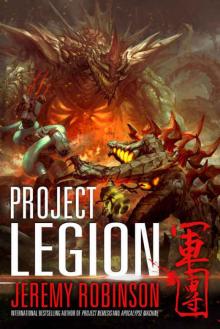 Project Legion (Nemesis Saga Book 5)
Project Legion (Nemesis Saga Book 5)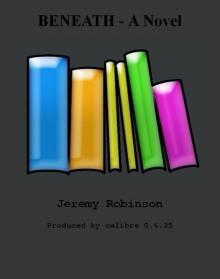 BENEATH - A Novel
BENEATH - A Novel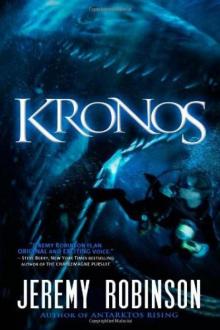 Kronos
Kronos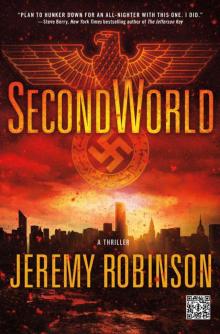 SecondWorld
SecondWorld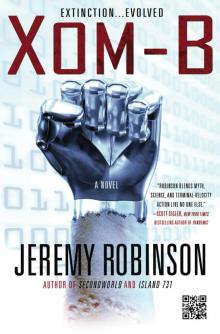 XOM-B
XOM-B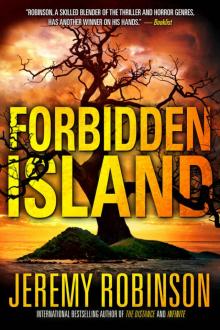 Forbidden Island
Forbidden Island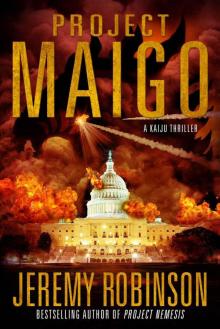 Project Maigo
Project Maigo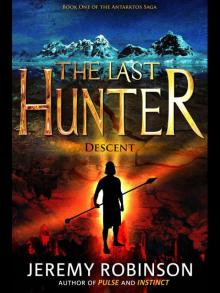 The Last Hunter - Descent (Book 1 of the Antarktos Saga)
The Last Hunter - Descent (Book 1 of the Antarktos Saga)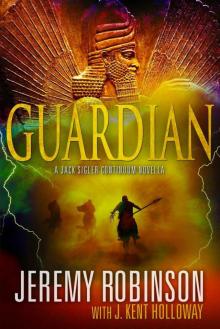 Jack Sigler Continuum 1: Guardian
Jack Sigler Continuum 1: Guardian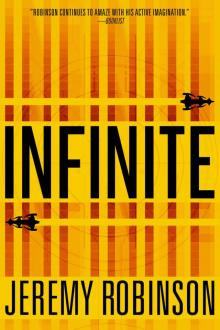 Infinite
Infinite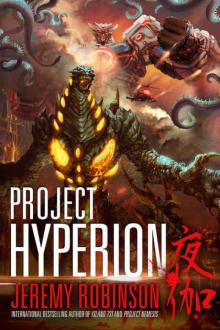 Project Hyperion
Project Hyperion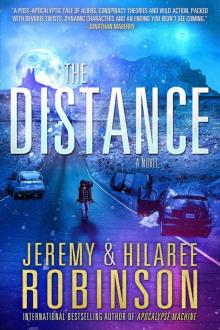 The Distance
The Distance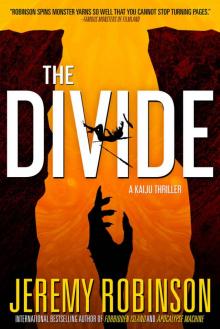 The Divide
The Divide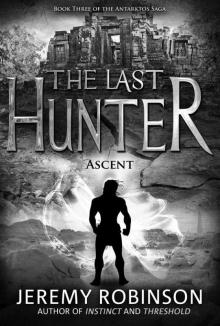 The Last Hunter - Ascent (Book 3 of the Antarktos Saga)
The Last Hunter - Ascent (Book 3 of the Antarktos Saga)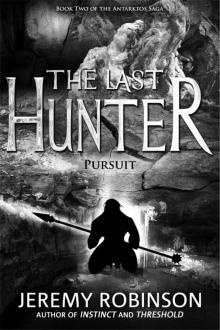 The Last Hunter - Pursuit (Book 2 of the Antarktos Saga)
The Last Hunter - Pursuit (Book 2 of the Antarktos Saga)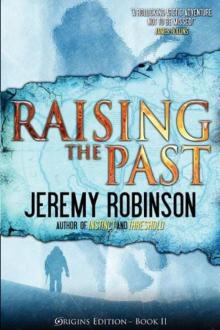 Raising the Past
Raising the Past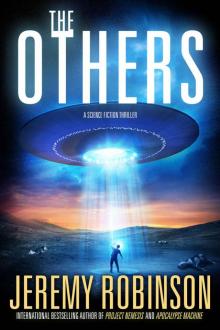 The Others
The Others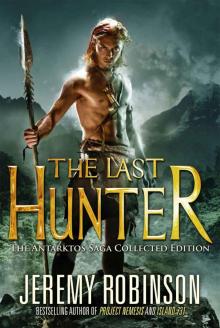 The Last Hunter - Collected Edition
The Last Hunter - Collected Edition Threshold
Threshold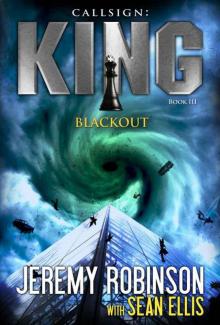 Blackout ck-3
Blackout ck-3 Antarktos Rising
Antarktos Rising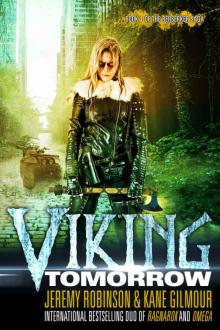 Viking Tomorrow (The Berserker Saga Book 1)
Viking Tomorrow (The Berserker Saga Book 1)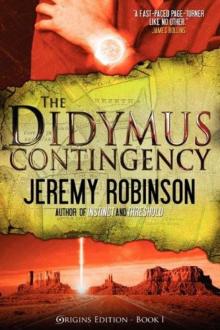 The Didymus Contingency
The Didymus Contingency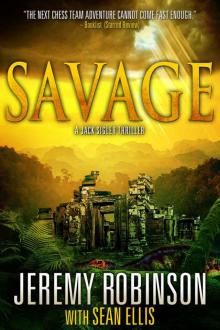 Savage (Jack Sigler / Chess Team)
Savage (Jack Sigler / Chess Team)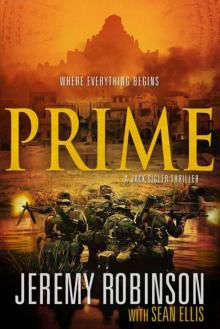 Prime
Prime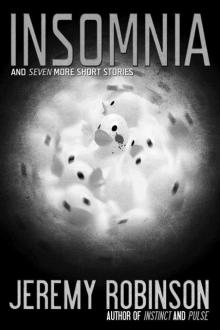 Insomnia and Seven More Short Stories
Insomnia and Seven More Short Stories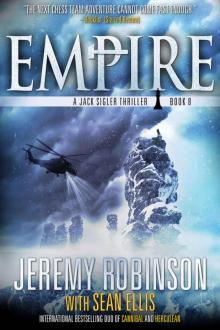 Empire (A Jack Sigler Thriller Book 8)
Empire (A Jack Sigler Thriller Book 8)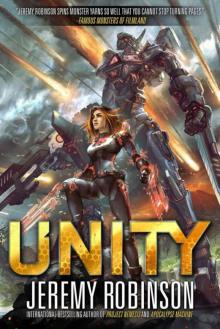 Unity
Unity Instinct
Instinct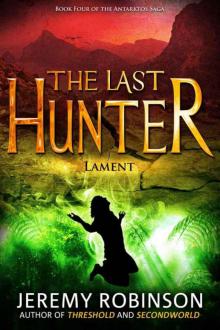 The Last Hunter - Lament (Book 4 of the Antarktos Saga)
The Last Hunter - Lament (Book 4 of the Antarktos Saga)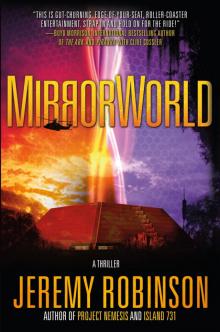 MirrorWorld
MirrorWorld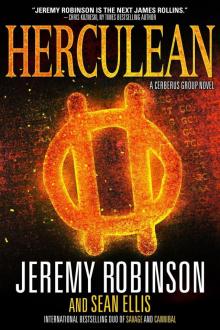 Herculean (Cerberus Group Book 1)
Herculean (Cerberus Group Book 1)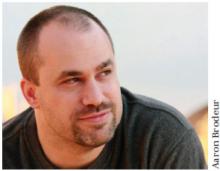 Island 731
Island 731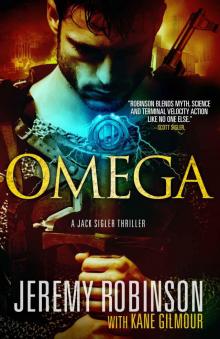 Omega: A Jack Sigler Thriller
Omega: A Jack Sigler Thriller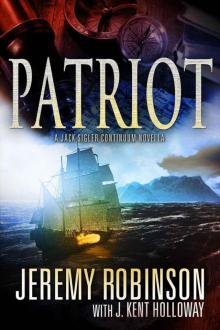 Patriot (A Jack Sigler Continuum Novella)
Patriot (A Jack Sigler Continuum Novella)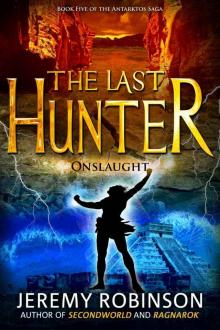 5 Onslaught
5 Onslaught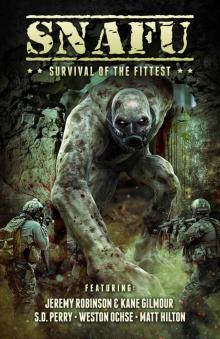 SNAFU: Survival of the Fittest
SNAFU: Survival of the Fittest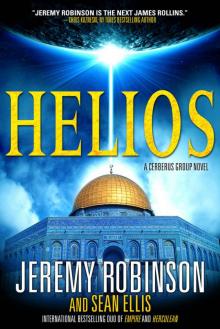 Helios (Cerberus Group Book 2)
Helios (Cerberus Group Book 2)